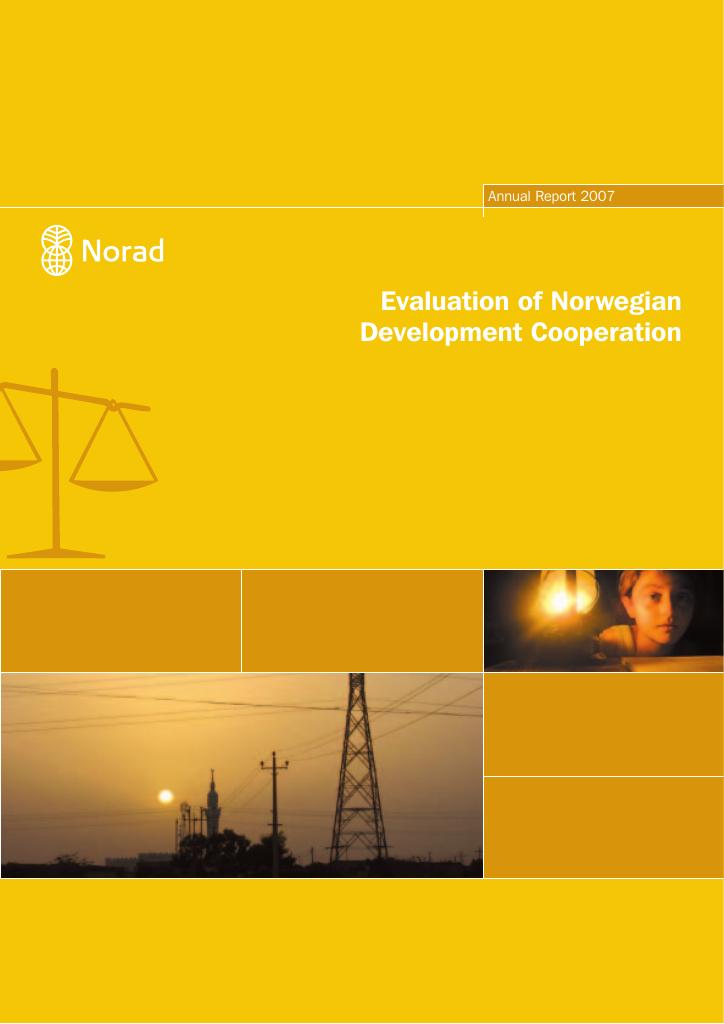Evaluering
Annual Report 2007 Evaluation of Norwegian Development Cooperation
"Continuous Tough Evaluation" from a "Strong IndependentEvaluation Department" This is what Erik Solheim, the Minister of the Environmentand International Development, expects of Norad's evaluationwork (The Trondheim daily Adresseavisa, 31 January2008). By virtue of a clear mandate, the evaluation departmenthas wide authority to implement independent andcritical evaluations of how the Norwegian developmentbudget is spent. This remains the case whether the responsibilityfor implementation is vested in the Ministry of ForeignAffairs, in Norad, in the multilateral system, or in Norwegianorganisations.We work systematically to cover all important parts of thedevelopment budget. In 2007 we completed sector evaluationof long-term aid in the petroleum area and for hydropowerdevelopment, and in 2008 we will evaluate the workin the fisheries sector and assistance in preserving culturalheritage. In 2007 we performed the first country evaluationfor a long time of the total Norwegian aid to one country,in the form of the Zambia study. In 2008 we will get togrips with aid to the Western Balkans, that is, the countriesof the former Yugoslavia.We are systematising the evaluation of the work of Norwegiannon-government organisations (NGOs). In 2007 wehave looked at Guatemala and in 2008 we shall deal withUganda. The emphasis will be on results.In the past year we have also performed two evaluations ofNorwegian humanitarian aid, one of the use of former militarytrucks in emergency relief and the other of NOREPS -the Norwegian Emergency Preparedness System. In 2008and 2009 we will continue with evaluation of peacebuilding,using as our point of departure the Guidance for evaluationof peace-building and conflict prevention that the EvaluationDepartment has helped to develop for OECD/DAC. Evaluationof assistance in promoting human rights is next in line.Are we then capable of living up to the Minister's expectations?Everyone who has worked in evaluation knows howdifficult it is to give clear answers. We are facing challengeson practically every front. Some of this is purely a matter ofmethodology; as a rule, our data are unreliable. When aid isharmonised with that from other donors it becomes difficult,and often impossible, to evaluate the impact of Norwegianfunds and Norwegian input. Even as regards independenceand roles, however, we may encounter problems: the peoplewho know most about aid in a particular area often sufferfrom a conflict of interest and cannot take part in the evaluations.This means that the consultants must spend a lot oftime getting acquainted with what they are to evaluate. Thefact that foreign firms often get the assignments helps tostrengthen the independent evaluation, but it also createsdistance. Another factor is that the consultant industry isoften accused of toning down its criticism for fear of losingfuture commissions. We do not believe this is the case, butthe perception may be real enough. The expertise of thosetaking the assignments may also vary widely.Our response to this is to be clear about roles and demanda high quality. We are very strict on conflicts of interest andregard it as our job both to encourage critical independenceand to protect the consultant against what can easily be perceivedas pressure from the objects of the evaluation. We arelaying increasing emphasis on having the results of the aiddocumented. We think that we have largely succeeded in this,as in the Zambia study, the Guatemala evaluation and in theevaluation of the hydropower aid. In the future, however, weshall be looking more closely at the use of money and atcost-effectiveness than we have so far managed to do.The Zambia evaluation is one example of a "tough" evaluation,in which fundamental questions were asked, and inwhich good results were obtained as regards institutionbuilding,at the same time as we found reason to enquirewhether the aid was sufficiently poverty-oriented. Theremay be more such evaluation projects in the future, wherewe also make use of other approaches to evaluation thanthose we have traditionally employed.
